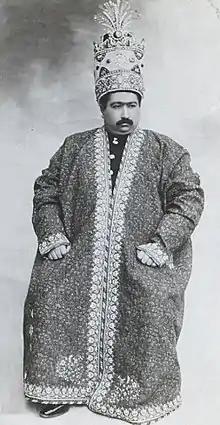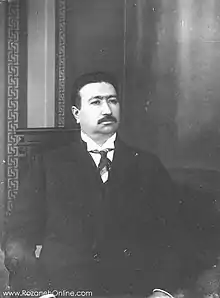| Mohammad Ali Shah Qajar | |||||
|---|---|---|---|---|---|
 Photograph published by G. G. Bain, 1907 | |||||
| Shah of Iran | |||||
| Reign | 3 January 1907 – 16 July 1909 | ||||
| Predecessor | Mozaffar ad-Din Shah Qajar | ||||
| Successor | Ahmad Shah Qajar | ||||
| Prime Ministers | |||||
| Born | 21 June 1872 Tabriz, Azerbaijan, Persia | ||||
| Died | 5 April 1925 (aged 52) San Remo, Italy | ||||
| Burial | |||||
| Spouse | Malekeh Jahan | ||||
| Issue | See below | ||||
| |||||
| Dynasty | Qajar | ||||
| Father | Mozaffar ad-Din Shah Qajar | ||||
| Mother | Taj ol-Molouk (Umm al-Khakan) | ||||
| Religion | Shia Islam | ||||
| Tughra |  | ||||
Mohammad Ali Shah Qajar (Persian: محمدعلی شاه قاجار; 21 June 1872 – 5 April 1925) Shah of Iran from 8 January 1907 to 16 July 1909. He was the sixth shah of the Qajar dynasty.
Biography
Mohammad Ali Shah Qajar was opposed to the Persian Constitution of 1906, which had been ratified during the reign of his father, Mozaffar ad-Din Shah Qajar. Therefore, he was frequently criticized by the publications of the period, including a weekly newspaper Musavat.[1] In 1907, Mohammad Ali dissolved the National Consultative Assembly and declared the Constitution abolished because it was contrary to Islamic law.[2] He bombarded the Majles (Persian parliament) with the military and political support of Russia and Britain.[3]
In July 1909, pro-Constitution forces marched from Persia's provinces to Tehran led by Sardar As'ad, Sepehdar A'zam, Sattar Khan, Bagher Khan and Yeprem Khan, deposed the Shah, and re-established the constitution. On 16 July 1909, the parliament voted to place Mohammad Ali Shah's 11-year-old son, Ahmad Shah on the throne. Mohammad Ali Shah abdicated following the new Constitutional Revolution and he has since been remembered as a symbol of dictatorship.
Having fled to Odesa, Russia (currently Ukraine), Mohammad Ali plotted his return to power. In 1911 he landed at Astarabad, Persia, but his forces were defeated.[2] Mohammad Ali Shah returned to Russia, then in 1920 to Constantinople (present day Istanbul) and later to San Remo, Italy, where he died on 5 April 1925. He was buried at the Shrine of Imam Husain in Karbala, Iraq. Every Shah of Persia since Mohammad Ali has died in exile.
His son and successor, Ahmad Shah Qajar was the last sovereign of the Qajar dynasty.[4]
Honours
- Austria-Hungary: Grand Cross of the Order of Leopold (1900)
- French Third Republic: Grand Cross of the Legion of Honour (1907)
- Ottoman Empire: Exalted Order of the House of Osman (1905)
- Russian Empire:
- Knight of the Order of St. Andrew (1905)
- Knight of the Order of St. Alexander Nevsky (1905)
- Knight of the Order of the White Eagle (1905)
- Knight of the Order of Saint Stanislaus, 1st Class (1905)
- Knight of the Order of St. Anna, 1st Class (1905)
.jpg.webp)
Marriages and children
Wives
Mohammad Ali Shah had two wives:
- Robabeh Khanum "Malih-os-Saltaneh"
- Princess Zahra Qajar "Malekeh Jahan", daughter of Kamran Mirza "Nayeb-os-Saltaneh"
Children
Mohammad Ali Shah had six sons and two daughters:
- Sons
- Hossein Ali Mirza "E'tezad Saltaneh"
- Gholam Hossein Mirza (died in infancy)
- Sultan Ahmad Mirza (later Ahmad Shah Qajar)
- Mohammad Hassan Mirza
- Sultan Mahmoud Mirza
- Sultan Majid Mirza
- Daughters
- Khadijeh Khanum "Hazrat-e Ghodsieh"
- Assieh Khanum
List of prime ministers

- Mirza Nasrollah Khan Moshir od-Dowleh (till 17 March 1907)
- Mirza Ali-Asghar Khan Amin os-Soltan (1 May 1907 – 31 August 1907)
- Mohammad-Vali Khan Tonekaboni (1st Term) (13 September 1907 – 21 December 1907)
- Hossein Khan Nezam os-Saltaneh Mafi (21 December 1907 – 21 May 1908)
- Morteza-Qoli Khan Hedayat Sani od-Dowleh (21 May 1908 – 7 June 1908)
- Prince Kamran Mirza Nayeb os-Saltaneh (7 June 1908 – 29 April 1909)
See also
References
- ↑ Iago Gocheleishvili (February 2007). "Georgian Sources on the Iranian Constitutional Revolution (1905-1911): Sergo Gamdlishvili's Memoirs of the Gilan Resistance". Iranian Studies. 40 (1): 60. doi:10.1080/00210860601138632. JSTOR 4311875. S2CID 153631653.
- 1 2 Donzel, Emeri "van" (1994). Islamic Desk Reference. ISBN 90-04-09738-4. p. 285-286
- ↑ "گزارشی از سمینار 'سده انقلاب مشروطیت ایران' در لندن". BBC Persian. 24 July 2006. Retrieved 23 May 2020.
- ↑ Soltan Ali Mirza Kadjar, 'Mohammad Ali Shah: The Man and the King', in: Qajar Studies. Travellers and Diplomats in the Qajar Era. Journal of the International Qajar Studies Association, volume VII, 2007.
Further reading
- Shablovskaia, Alisa (2019). "Treacherous friends or disenchanted masters? Russian diplomacy and Muhammad 'Ali (Shah) Qajar, 1911-1912". British Journal of Middle Eastern Studies. 48 (4): 1–18. doi:10.1080/13530194.2019.1683717. S2CID 210459869.
.jpg.webp)